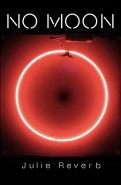
Book Review: No Moon by Julie Reverb

No Moon
Fiction by Julie Reverb
Calamari Archive, September 2015
ISBN-13: 978-1940853062
$13.00; 110 pp.
Reviewed by Edmund Zagorin
Julie Reverb’s debut book titled No Moon is a family poem, family story, family love affair, and family porno. Reverb’s narrative has a persistent liquid feel: “80’s lukewarm saxophone oozes around a white-suited man on a stepladder, tipping food into a panoramic fishtank.” Reverb’s a singer, and her writing sings, too, slowly and laced with the estrangement of a profound emotional energy running against every current of convention. The discoball’s refraction on the back cover isn’t a bad diagram for what the prose does: inverts, fragments, and flings language into every dark corner of the mind’s own grimy theater.
Reverb’s sections are vignettes more than straightforward chapters. In the midst of this confusion, Reverb achieves moments of humor akin to Irvine Welsh or even Banville. In “Bad News Circus,” for instance, Mad Sinbad
grins the same paving slabs across the row of spot-lit photos, his pally death-grip on minor celebrities, all confused, cross-eyed, staking mild crisis vividly. There are newspaper clippings of run-ins and melting time, his quotes highlighted and asterisked. “I maintain it was self-defence,” he says in most of them. “But yeah, I’m taking anger management classes.”
Like much of the book, the exact action is obscured by the swell and sweep of language that nevertheless moves the reader along at quite a dizzying clip. There’s a viscosity to the relationships, as if each were a sticky embrace. Billy is a luckless charlatan bent on opening a striptease theater with Lucy’s dancing as its main attraction. Equally luckless, Lucy comes off as sympathetic and her dancing is written with a spare and earnest awe. Mad Sinbad is the mysterious crook who absconds and returns to a hideout in Spain, drinking himself farcical and bothering British tourists. Reverb’s men are dark, crooked, self-congratulatory and self-pitying, slimy in the same gesture as their tenderness. Readers may end up wanting the struggling little theater to succeed, even in spite of themselves.
Reverb’s diction veers with a poised wildness, with the same page bearing “tetchy” in the same paragraph as “etiolated.” And yet it is that same wildness from which it delivers some of contemporary experimental fiction’s greatest synaesthetic delights; the TV is a “noise mask,” the stars “glowed loud,” and looking is often written “drinking,” as if faces were cups laden with water or booze. Reverb makes senses shift their registers across prose dense with bleakness, where aspirations could either be shelved in favor of “brusque labial display” or “shoved down a plank, vivid and alive, crawling at all times.” This is prose best savored with a certain morbidness, or at least an appreciation for the culture of back alleys.
Edmund Zagorin is a writist at elizeyaquate.com. His first collection of stories The Face of Our Town (Kernpunkt Press) is out Summer, 2016.

Leave a Reply